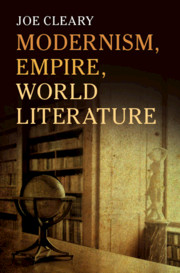Book contents
- Modernism, Empire, World Literature
- Modernism, Empire, World Literature
- Copyright page
- Dedication
- Contents
- Acknowledgements
- Chapter 1 ‘A Language That Was English’: Peripheral Modernisms and the Remaking of the Republic of Letters in the Age of Empire
- Chapter 2 ‘It Uccedes Lundun’: Logics of Literary Decline and ‘Renaissance’ from Tocqueville and Arnold to Yeats and Pound
- Chapter 3 ‘The Insolence of Empire’: The Fall of the House of Europe and Emerging American Ascendancy in The Golden Bowl and The Waste Land
- Chapter 4 Contesting Wills: National Mimetic Rivalries, World War and World Literature in Ulysses
- Chapter 5 ‘That Huge Incoherent Failure of a House’: American Ascendancy and American Epic in The Great Gatsby and Long Day’s Journey into Night
- Chapter 6 ‘A Wreath of Flies?’: Omeros, Epic Achievement and Impasse in ‘the Program Era’
- Notes
- Index
Chapter 2 - ‘It Uccedes Lundun’: Logics of Literary Decline and ‘Renaissance’ from Tocqueville and Arnold to Yeats and Pound
Published online by Cambridge University Press: 16 June 2021
- Modernism, Empire, World Literature
- Modernism, Empire, World Literature
- Copyright page
- Dedication
- Contents
- Acknowledgements
- Chapter 1 ‘A Language That Was English’: Peripheral Modernisms and the Remaking of the Republic of Letters in the Age of Empire
- Chapter 2 ‘It Uccedes Lundun’: Logics of Literary Decline and ‘Renaissance’ from Tocqueville and Arnold to Yeats and Pound
- Chapter 3 ‘The Insolence of Empire’: The Fall of the House of Europe and Emerging American Ascendancy in The Golden Bowl and The Waste Land
- Chapter 4 Contesting Wills: National Mimetic Rivalries, World War and World Literature in Ulysses
- Chapter 5 ‘That Huge Incoherent Failure of a House’: American Ascendancy and American Epic in The Great Gatsby and Long Day’s Journey into Night
- Chapter 6 ‘A Wreath of Flies?’: Omeros, Epic Achievement and Impasse in ‘the Program Era’
- Notes
- Index
Summary
Nineteenth-century British and French intellectuals set the terms by which Europe evaluated Irish and American cultures before World War I. Alexis de Tocqueville’s Democracy in America proposed that democratic literatures would be deformed by social levelling and market forces and unable to rival aristocratic literatures for distinction. Rare exceptions might occur at brief tipping points when democratic and aristocratic cultures mutually contested and energized each other, but the emergence of a new mass culture less sophisticated than classical or aristocratic literatures seemed inevitable. In Studies in Celtic Literature, Matthew Arnold proposed that though the Celtic peoples of the United Kingdom were too unruly to govern their own affairs, their literatures possessed qualities of lyrical imagination that might usefully correct the worst elements of a materialist modern English culture. Nineteenth-century literary renaissances in Ireland and the United States were founded upon and reacted against these discourses. William Butler Yeats and Ezra Pound emerged as especially important figures, daringly reworking received literary discourses to set the terms for a brilliant new modernism that sometimes became stridently anti-democratic in its bid to challenge the degradation of taste that nineteenth-century liberal writers like Tocqueville and Arnold had forecast.
Keywords
- Type
- Chapter
- Information
- Modernism, Empire, World Literature , pp. 49 - 102Publisher: Cambridge University PressPrint publication year: 2021



